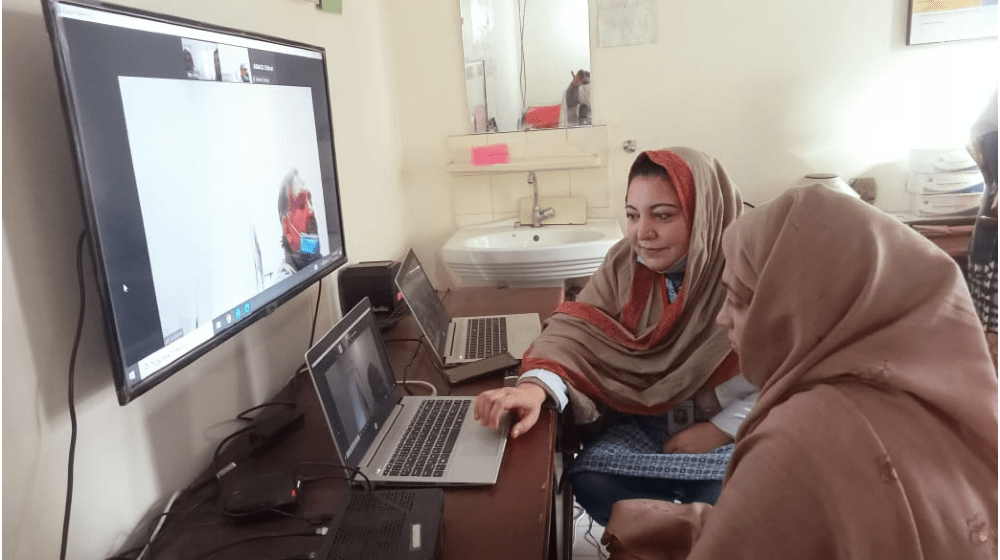In the tranquil village of Brep in the Upper Chitral district of Khyber Pakhtunkhwa, a groundbreaking initiative is reshaping the very fabric of healthcare. Introducing teleconsultation screens has marked a pivotal moment in the region's medical history.
At the heart of this transformative journey is Miss Husun Ara, a dedicated Lady Health Visitor whose unwavering commitment has turned teleconsultation from a novel concept into a lifeline for the community. Miss Ara's empathetic approach has made telehealth an integral part of the village's healthcare fabric, overcoming hurdles such as unreliable internet connectivity and initial patient scepticism.
"Initially, teleconsultations were not a smooth process. The unreliable internet connection made it frustrating, and we had to manage both regular in-person patients and those facilitated through teleconsultation. Patients found it difficult to trust having medical consultations at home when consulting with a doctor, making it a cumbersome task. However, the internet issue was fixed, and the teleconsultation screen quickly became a regular part of everyday life," says Miss Ara.
When asked whether sessions in the main consultation room disturbed their regular patients' routines, she mentioned that the setting had significantly aided them in creating awareness about the teleconsultation treatment method. Initially, they allowed other patients to observe and understand how teleconsultation works. The story of teleconsultation quickly spread throughout the area. "Now, they have the flexibility to move the screen to a separate room whenever needed," explains Miss Ara.
Beyond the convenience of avoiding arduous journeys to the district centre, teleconsultation has proven to be a beacon of medical excellence. Miss Ara sheds light on its impact, emphasizing extended follow-up sessions that enhance patient-doctor relationships, ultimately improving the quality of healthcare delivery.
Miss Ara believes that remote consultations can help doctors monitor the patient's changing status more effectively. This, in turn, reinforces the doctor's commitment to the patient's wellness. Doctors can follow up by calling and checking on the patient's status the following day, which is an added advantage of teleconsultation.
The Aga Khan Health Centre is implementing the initiative, supported by the "Sihaat Mand Khaandaan (SMK) Project: Healthy Families for Pakistan Through Accelerating Sexual Reproductive Health (SRH) and Family Planning (FP) Services (2020-2024)", a project aimed at improving the reproductive health and rights of women, adolescents, and youth in different regions. It is part of a broader initiative to accelerate sexual and reproductive health and family planning services in Pakistan. Global Affairs Canada funds it through the High Commission of Canada in Pakistan.
The Aga Khan Health Center's staff members noted that teleconsultation has proven to be very effective in preventing medication errors that could have been fatal. Miss Ara narrates a particular incident that involved a young patient suffering from hypertension. Usually, this type of condition would be treated with anti-hypertensive medications to alleviate the pressure. However, the consulting doctor advised against administering anti-hypertensive medicines during a teleconsultation. The doctor cautioned that it could potentially harm the brain by thinning the blood. Miss Ara shares this story with a deep sigh of relief.
The staff members at the health center are proud of their ability to learn from doctors through teleconsultation sessions. For instance, Miss Ara mentioned that they once had a teleconsultation session with a young patient experiencing bedwetting. The patient felt relief after following the prescribed course of medication provided by the doctor. Miss Ara also added that, following this experience, she was able to successfully cure three more young men with the same issue of bedwetting.
According to Miss Ara, there is increasing awareness and demand for teleconsultation services from patients at Buni Medical Center. She says many patients who availed of consultation sessions on the screen have already become familiar with the doctors. However, patients with specific illnesses expect to have access to specialized doctors and are disappointed when they cannot do so. Miss Ara feels it would be unfair to the patients if they are not provided access to specialist doctors, given the advancements in health technology. She is determined to ensure the centre offers this service to the patients.
Miss Ara's unbounded quest for learning sets her apart in caregiving. Her eagerness to learn extends not only to herself but also to sharing her experiences with others. Her desire to learn extends not only to herself but also to sharing her experiences with others. When asked about the need for more training or education in the newly introduced medical technology, she suggested organizing an experience-sharing gathering at the district level. "This gathering would include all staff members, including nurses, LHVs, and doctors involved in teleconsultation, to share their learning and discuss challenges," she suggests.


